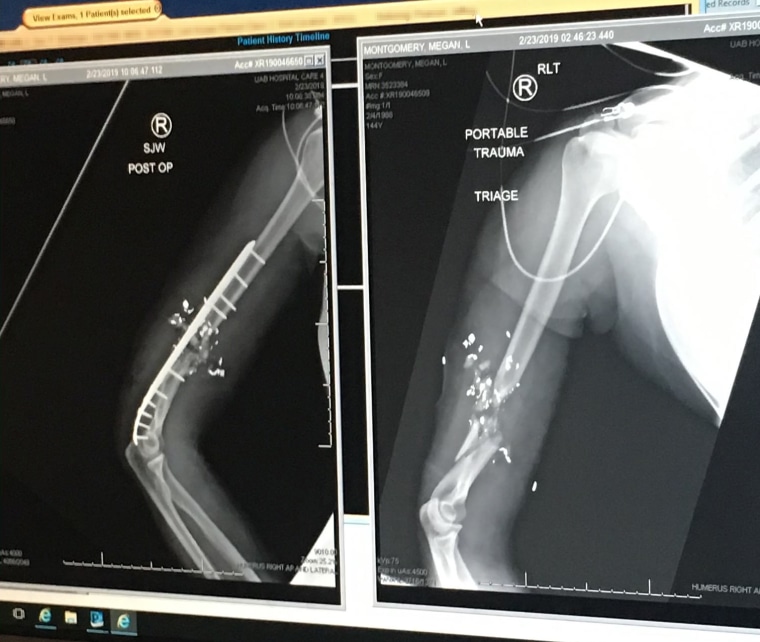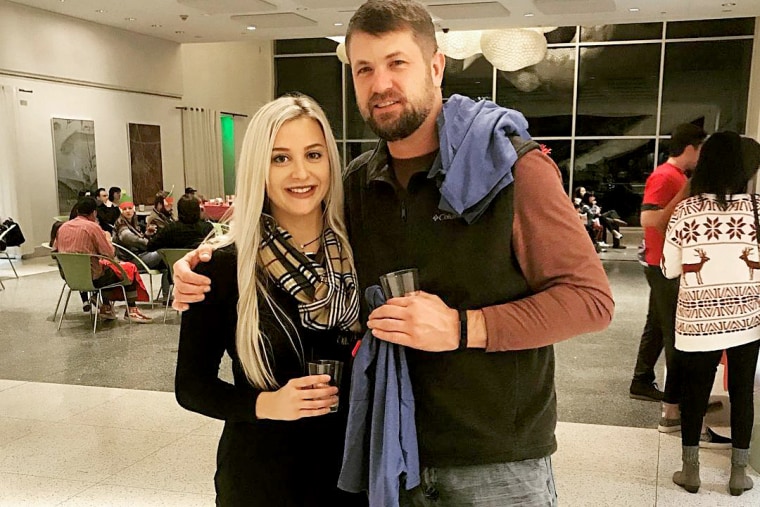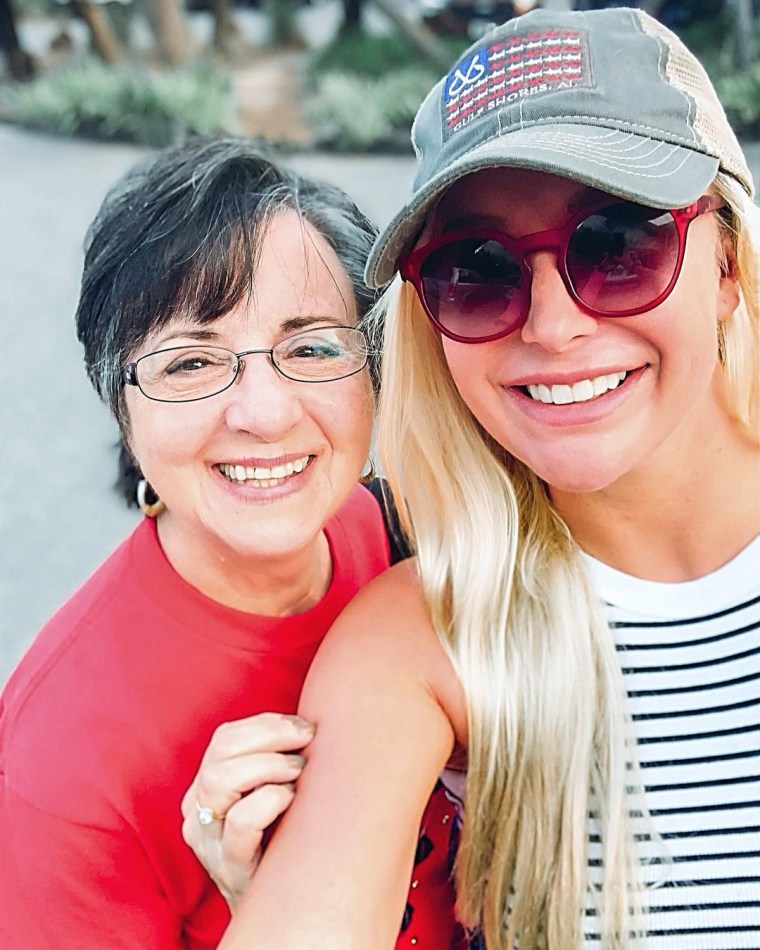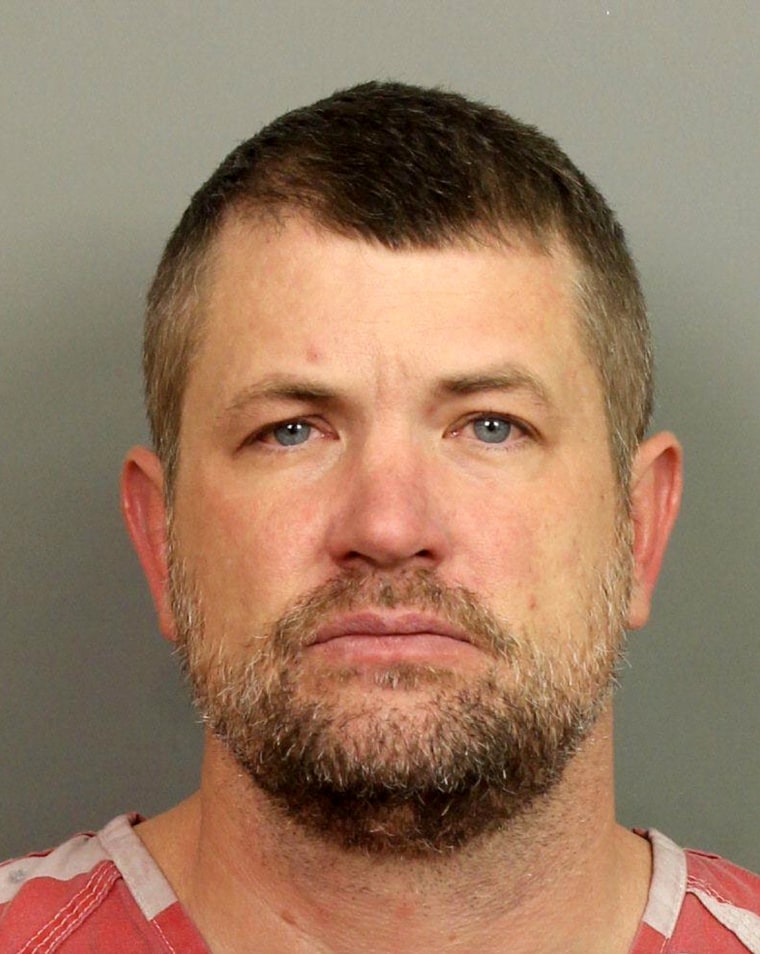HOOVER, Alabama — Late one night in February 2019, a 31-year-old woman in a troubled marriage was rushed to an emergency room in a Birmingham, Alabama, suburb, with a gunshot wound in her upper right arm.
"He shot me," Megan Montgomery told doctors, according to an investigative report obtained exclusively by NBC News. By "he," she meant her husband, a local police officer named Jason McIntosh.
Police took her husband’s pistol away. Nine months later, the state’s top law enforcement agency gave it back, despite pending domestic violence charges and an active protective order. Just 16 days after that, he used the gun to shoot and kill her during another late-night dispute.
Montgomery's loved ones were shattered by the loss of a devoted daughter and sister, a marketing professional with a passion for animal rescue. They were stunned to be told recently by NBC News that the state had given her abuser back the weapon he used to kill her.

"So the restraining order can prohibit him from ‘contacting, phoning, texting, harassing, stalking,’ but oh by the way, you can have a gun? That’s ridiculous," said Megan’s mother, Susann Montgomery-Clark.
Even the shooter’s lawyer was shocked he got his weapon back. "In my opinion it was irrational, illogical and not prudent to do so," said attorney Tommy Spina, who emphasized he was not excusing his client’s actions. Spina said that without the firearm, "I don’t think what happened that night would have happened that night."
Women whose domestic abusers have access to a firearm are five times as likely to be shot and killed, according to research funded by the U.S. Department of Justice.

These murders are also on the rise. After a triple-decade decline in cases where women were killed by guns wielded by their intimate partners, the number of deaths has been increasing since 2013, according to an analysis of FBI data by criminologist James Alan Fox at Northeastern University.
In 2019, the most recent year the data is available, 964 women were shot and killed by their domestic partners compared to 211 men and women who died that year from mass shootings. That’s one woman killed by an intimate partner every nine hours.
While federal law and many state statutes prohibit domestic abusers from possessing a firearm when a domestic violence protective order is in place, few states actually take the guns away or keep them away from abusers once a protective order is issued. Alabama has such a law, but domestic abusers often end up keeping their weapons.
Experts say the reason is a combination of deference to gun rights on the part of judges and other officials, the absence of a defined procedure to remove the guns and a lack of awareness by law enforcement about just how lethal the risk can be.
Allison Dearing is the executive director of One Place Metro Alabama Family Justice Center in Birmingham, which provides services to domestic violence victims. Seven women, including Montgomery, were shot and killed by their intimate partners in Jefferson County in 2019.
"We know they are predictable and preventable," she said, "but we still aren’t treating them that way."
Megan Montgomery did nearly everything experts say you’re supposed to do to get away from a domestic abuser, and still she died.
The timeline
Jason McIntosh, a 43-year-old officer with the Hoover, Alabama, police department, married Megan Montgomery, 13 years his junior, in February 2018 at their local courthouse. One year later they held a second ceremony in New York. Montgomery posted dozens of happy pictures on Instagram.
But behind the scenes their relationship had quickly turned volatile, the bride’s mother said. She told NBC News she remembers a time Montgomery called asking to be picked up because she was stranded in a Walmart parking lot after an argument with McIntosh. "We talked to her about it," Montgomery-Clark said, "but we didn't know how bad it was."
"She knew if she left [him], she would be killed."

On the night of Feb. 23, 2019, Montgomery and McIntosh got into a physical altercation at their home. Fellow officers from McIntosh’s department responded to a 911 call from McIntosh, who reported that Montgomery had a gunshot wound.
According to the responding officers, Montgomery said she had grabbed McIntosh’s duty weapon with her right hand for her own protection. The two began to struggle for the weapon. Montgomery, 5’8" and 135 pounds, was shot in her upper right arm.
McIntosh, 6’4" and 225 pounds, told the responding officers that during the struggle he thought Montgomery had his cell phone in her hand. According to the report, McIntosh said it was only when the gun went off and the bullet hit his wife that he realized they’d been fighting over a gun.
Because McIntosh was a police officer, the head of the Alabama Law Enforcement Agency ordered Special Agent Vince Cunningham to investigate the incident. ALEA, a state-level agency, is the standard investigating entity for police-involved shootings in Alabama.
Cunningham took McIntosh’s firearm as evidence. He interviewed Montgomery on Feb. 26, 2019. She told him that during the incident "she was afraid," according to the investigative summary written by Cunningham and obtained exclusively by NBC News.
The ALEA summary says that when Montgomery was asked if the shooting was an accident, she said yes. The summary also says that the officer who took Montgomery to the emergency room told Cunningham that when doctors asked Montgomery what happened, she told them, "He shot me."
The ALEA report does not include any reference to a chilling 13-minute recording of a conversation between McIntosh and Montgomery that Montgomery’s attorney says she gave the agency. On the tape, reviewed by NBC News, McIntosh talked about his fascination with serial killers and how planning mass shootings was a "soothing thought" that helped him sleep at night. He also told his wife he’d felt the urge to beat her to death with a tennis racket, and if he did do it he’d stand over her body and say, "Laugh now, bitch."
The district attorney did not file charges, concluding in a letter there was "no evidence of the commission of any felony offenses by either Mr. Mcintosh or Ms. Montgomery." The DA left open the possibility that the city of Hoover could file a misdemeanor offense against either one of them. That never happened.
McIntosh resigned from the Hoover department in March amid an internal affairs review of the shooting.
Montgomery did what is difficult for most domestic violence victims to do. She moved out. She moved in with her parents and filed a request for a protection from abuse order.
Montgomery’s filing asked the court to remove McIntosh’s firearms. In response, the local judge issued a mutual restraining order telling the couple to stay away from each other. The order did not specify that firearms be removed.
The order also did not keep them apart. On the night of May 5, the couple got into another argument at the home they had shared and the police were called. Again, officers from the Hoover department responded to the call. The police report says McIntosh had tackled Montgomery to the ground in the garage and documented a swollen area near her ribs where she said he hit her.
Again, Montgomery did what experts say she needed to do. She pursued the filing of domestic violence charges. McIntosh was arrested and later released on bail.
Later that month, Montgomery also filed for divorce.
Her mother said she attended counseling and posted sticky notes in her room saying, "I am strong. I am strong. I am strong."

By September she had taken another significant step in her separation from her husband. She got a new apartment and moved in.
Meanwhile, McIntosh was repeatedly texting ALEA special agent Cunningham asking to get his gun back, according to documentation reviewed by NBC News. McIntosh claimed he needed the gun to get a new private security job. Though he had used it as a duty weapon with the Hoover Police Department, the gun was his personal property.
In text messages, Cunningham arranged with McIntosh to meet him at the parking lot of the local ALEA office. On Nov. 15, 2019, he handed McIntosh his gun, according to ALEA.
Thirteen days later, on Thanksgiving, Montgomery was with her family and posted family photos.
Two days later, on the night of Saturday, Nov. 30, Montgomery was out with friends at a nearby oyster bar after watching Auburn’s football team edge out Alabama at an Iron Bowl party.
According to an eyewitness account later posted on Facebook, McIntosh entered the bar and walked up to their table.
"He placed a hand on the back of her neck and one on her shoulder and told her to walk outside," said the Facebook post.
"We all looked at him, asked who he was and he said, 'That’s my wife, she’s going with me.'"
The man who wrote the post said Montgomery agreed to go with McIntosh, "but the look in her eyes is one I will never forget."
They left the bar together and drove around in McIntosh’s truck, ending up 7 miles away in the parking lot of the Mountain Brook athletic center, Mountain Brook police say. McIntosh kept his gun in the truck, according to his lawyer.
At 4:30 the next morning, an officer on routine patrol found her body face down in the parking lot. She had been shot three times.
"Our worst fears came true," Montgomery's mother said.

The arrest warrant issued for McIntosh reads, "Jason Bragg McIntosh caused said death during a time a court had issued a protective order for Megan Louise Montgomery against Jason Bragg Mcintosh."
Because of the existence of the protective order, state prosecutors charged McIntosh with capital murder punishable with the death penalty.
The day after Montgomery was found dead, a letter addressed to her arrived at her home. Her mother opened it. The letter was from the county court and said Montgomery was due at the courthouse on Dec. 4 to testify in McIntosh’s domestic violence case. The case had been pending since she pressed charges in May.
On March 31, 2021, McIntosh pleaded guilty to the reduced charge of murder. He was sentenced to 30 years in state prison.
Nothing on the books
A spokesperson for ALEA said, "If ALEA had not returned the weapon, Mr. McIntosh could have legally purchased a firearm."
But McIntosh’s attorney noted that even though his client could have bought another gun, he never did.
"ALEA had the firearm in their possession since February of 2019 and at no time did Jason ever attempt to acquire another firearm," Spina said.
The ALEA spokesperson also told NBC News, "The gun was Mr. McIntosh’s personal property, the investigation was closed, and ALEA had no legal justification for keeping his private property. Additionally, the restraining order did not restrict Mr. McIntosh’s access to firearms. If the gun had been a department issued service weapon, ALEA would have returned it to the department."
But Alabama law specifies that no person "who is subject to a valid protection order for domestic abuse … shall own a firearm or have one in his or her possession or under his or her control."
Lindsay Nichols, federal policy director at the Giffords Law Center, a national anti-gun violence group, said that "the laws say this person shouldn’t have a gun period."
"What they should have been thinking was this person is not eligible to possess guns because this restraining order exists," Nichols said. "And therefore, I can’t give him his gun back."
According to Nichols, Alabama and 28 other states have statutes mirroring a federal law that says anyone convicted of a domestic violence crime or subject to a restraining order is prohibited from possessing a gun.
But she said few states have actual procedures to track abusers and compel them to surrender their firearms.
"The federal law that says these people are prohibited from possessing guns, it doesn’t automatically make the guns disappear out of their hands," Nichols said.
"There's nothing at all on the books in Alabama that requires the court to tell the person that they have to surrender guns," she said.
Courtney Cross, who directs the domestic violence clinic at the University of Alabama School of Law, said she agrees with Nichols’ interpretation of the state statute and that it does not need to be specified in a restraining order that guns are prohibited.
"It is generally understood with a restraining order you cannot possess a firearm," she said.
But Cross said few judges in Alabama, who are elected officials, push defendants to turn over weapons. Instead, she said they leave it up to the defendant to decide how to disarm, and it often doesn’t happen.
"I think it’s because of the general ethos of gun rights," Cross said, "in part because there is perhaps an expectation that people who own or possess a firearm should be able to dispose of it however they want to, selling it or giving it to a family member."
And while she said she thinks it would be a "great idea" to have a law like the one recently passed in Louisiana that actually enforces a process for surrendering firearms, she can’t see it happening in Alabama.
ALEA declined to comment about the 13-minute tape in which McIntosh talks about mass shootings and killing his wife and the assessment of Cross and Nichols that returning the weapon to McIntosh was contrary to state law.
Meanwhile, there is no federal data that tracks how many women have been shot and killed by their domestic partners despite a restraining order. But, Montgomery's mother said, "Megan’s story has been repeated across this country thousands of times."
She and her family have started a fund committed to preventing domestic violence by educating women in high school and college about the signs of abusive relationships.
